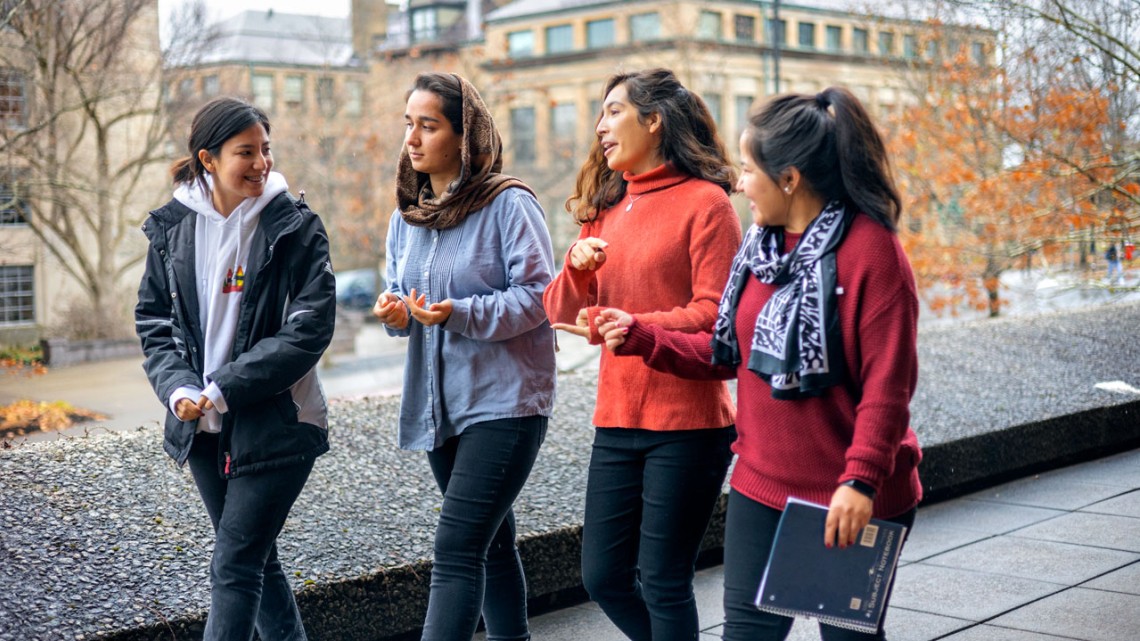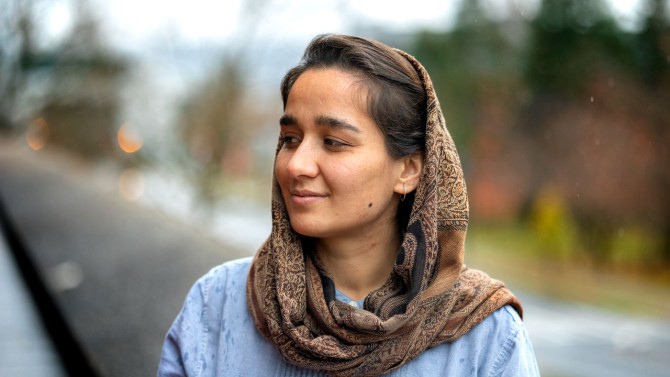
From left, Tamana Ahmadi, Sepehra Azami, Diana Ayubi and Simah Sahnosh walk outside Uris Hall. They are among nine Afghan undergraduates who will be arriving on campus through December.
Afghan women scholars find safe haven at Cornell
By Susan Kelley
As the Taliban took control of Afghanistan this summer, 150 women – all students at Asian University for Women, trying to flee the country so they could continue their educations – circled Kabul Airport on rented buses for 64 hours.
“It was really risky,” said Diana Ayubi, because the Taliban were attacking buses and firing their guns, killing people. The students were at particular risk, because the Taliban routinely beat and killed women unaccompanied by male relatives. And, Simah Sahnosh said, “the Taliban were taking young women for themselves.”
They decided to try one more time, at 1 a.m.
“It was so dark. I could hear a lot of gunshots around us,” said Sepehra Azami, who singlehandedly supported her family by working for an NGO and translating for a journalist while going to school full time. “But there was a strong feeling of power that pushed me all the time, to go ahead, to not give up.”
Thanks to an international effort and a robust cross-campus collaboration, Azami, Ayubi and Sahnosh are among nine Afghan women undergraduates who will be arriving at Cornell through December. The support at Cornell includes academic assistance, orientation sessions, care packages, donated laptops, financial aid and cultural training for the staff assisting them. Ithaca College is providing housing in a women’s dormitory until Dec. 18, when Cornell rooms will become available.
“We are so glad to welcome these students onto the Cornell campus and into the community,” said Provost Michael I. Kotlikoff. “We are enriched by having them here with us.”
Leaders and innovators
The students had started their undergraduate careers in Chittagong, Bangladesh, where AUW enrolls about 800 women from across Asia. But because of COVID-19, all AUW students studied remotely from their home countries during the last academic year.
As the Taliban began controlling remote provinces, AUW administrators planned to evacuate the students over a period of months, said Tim DeVoogd, professor of psychology in the College of Arts and Sciences, who serves on the AUW board of trustees.
But as the Taliban’s takeover accelerated, the urgency escalated. AUW rented seven buses and reached out to the U.S. military for assistance.
But because AUW administrators were in Bangladesh, the students would have to make it out on their own.
Azami, a senior majoring in economics, led the bus convoy and student coordinators, one per bus, and kept in constant touch with AUW administrators by WhatsApp.
Babies screamed as the Taliban fired guns just a few feet away. Thousands of other Afghans jostled at the airport gates. “Anyone could have lost their life at any moment,” said Ayubi, who is one semester away from graduating with a bachelor’s degree in public health. “We were all trying to save our lives and our futures.”
Through a long chain of contacts, ultimately involving the White House, the students got past the Taliban guards. They collapsed on the floor of one of the last flights out of Kabul.
But the click of the closing door on the U.S. military transport brought no relief, Ayubi said. “When the door was closing, I felt it was shutting down everything I had left behind: my memories, dreams and hopes for my family and Afghanistan.”
They eventually landed at a U.S. Army installation in Fort McCoy, Wisconsin, where they have spent the last two and a half months. When they found themselves among 13,000 other Afghan refugees at the base, they started schools to teach basic English to Afghan children, DeVoogd said. “These students are all leaders and innovators.”
Meanwhile, AUW officials were reaching out to colleagues, including DeVoogd, to place the students at U.S. universities. DeVoogd proposed that Cornell become involved. “The Office of the Vice Provost for International Affairs (OVPIA) was enthusiastic and worked through a huge number of logistical challenges to make this happen,” he said.
The students now have an immigration status – humanitarian parole – that allows them to work in the U.S. for one year while they apply for another status, said Nishi Dhupa, associate vice provost for international affairs. “It gives them a year of breathing room.”
At Cornell, they are considered visiting interns until they are officially accepted as undergraduates.
“The events that brought these students here are traumatic, but their stories demonstrate real bravery and leadership,” said Wendy Wolford, vice provost for international affairs. “They are an inspiration, and I am grateful for all of the people from across the university and town who have mobilized to support them.”
Cornell is also working to bring several Afghan graduate students and a threatened artist to campus. Another Afghan graduate student arrived in September.
Cornell’s support began long before the students arrived, led by the OVPIA. The Mario Einaudi Center for International Studies organized a cultural orientation for staff who would be assisting the students. Zinab Zhra Attai, an Afghan doctoral candidate in government, encouraged staff to “offer normalcy and friendly support,” she said. “These women are the opposite of fragile.”
The Einaudi Center and the Office of Global Learning also organized orientation sessions for the students, as well as care packages, gift cards and a tour of the local supermarkets. Cornell Information Technology donated laptops.
Yasin Ahmed, Muslim campus minister with Cornell United Religious Work, has recruited peer mentors from the Muslim Educational and Cultural Association, a student group. The local Muslim community will hold a welcome party at Al Huda Islamic Center and will introduce them to local families who speak the students’ native languages. “Especially with international students, we try to focus on familiarity and stability,” Ahmed said.
Undergraduate Admissions is assessing their academic needs and organizing financial aid packages. Meanwhile, DeVoogd has placed them in labs with faculty from nearly every undergraduate college and school on the Ithaca campus. In the spring semester, the women will be able to work part-time at Cornell University Library, providing a source of income. Also providing support are Cornell University Police and the English Language Support Office. Offers of assistance may be made to Nishi Dhupa at nd46@cornell.edu.
The women are determined to continue their education, they said. “I knew that I may lose my life by leaving Afghanistan,” Azami said. “But I want to study properly, and create opportunities for my younger siblings to continue their education as well.”
So far, they feel comfortable on campus, they said, which has a similar international academic environment as AUW. They dress in Western clothing, as they did at AUW. Members of the Women’s Higher Education Now student group are running a clothing drive and raising funds for the students.
The students say they are grateful for the safety and support Cornell is providing. “I am fortunate that I am here,” Azami said. “It was one of my dreams to come to the United States to continue my higher education.”
However, they also say they feel overwhelmed by their experiences. Azami tries not to look at the lovely surroundings when she walks around campus; she feels badly thinking of those back home who don’t have the same opportunities. When Sahnosh eats in the dining hall, she thinks of the stories her brother in Kabul tells her, of Afghans lining up outside of bakeries, begging for food.
“The truth is, right now I am homeless,” Ayubi said. “Before, I was proud of my country, culture and religion. Now, whether people like it or not, they must follow the Taliban’s rules. This is not the Afghanistan I call my homeland.”
Media Contact
Get Cornell news delivered right to your inbox.
Subscribe

